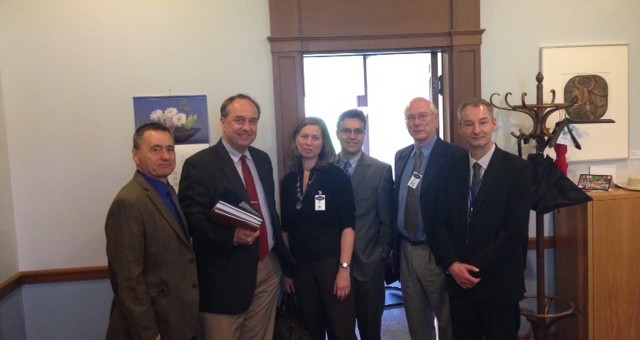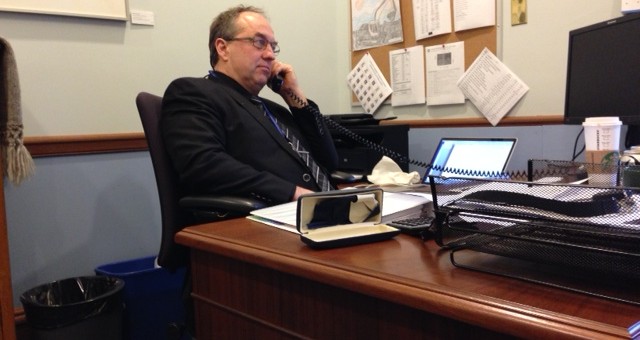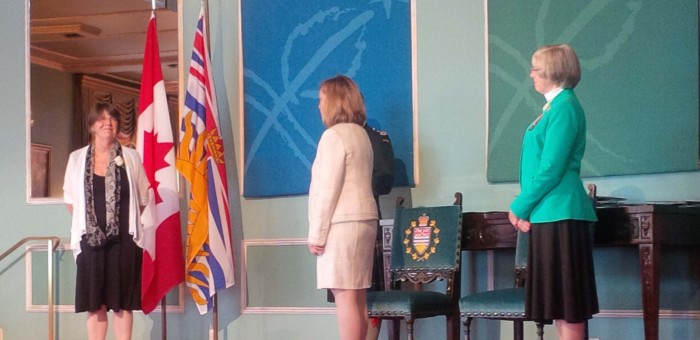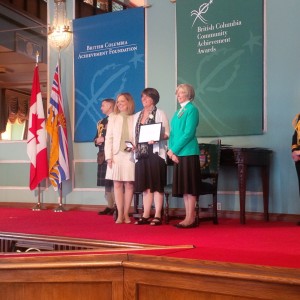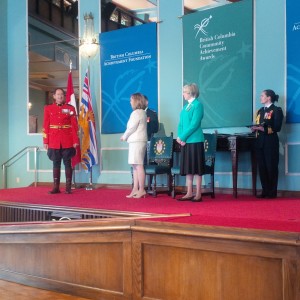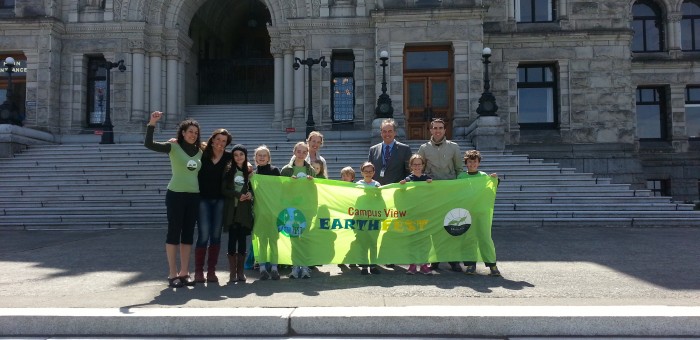Community Blog
Petitions Call on Province to Review CRD Sewage Plan
Media Statement: May 5, 2014
Petition Calls on Province to Review CRD Sewage Plan
For Immediate Release
Victoria BC – Today Andrew Weaver presented three petitions to the House calling on the Provincial Government to pause and review the Capital Regional District proposal for secondary sewage treatment. The petitions totaling over 2600 signatures from residents throughout Greater Victoria were organized by The Prospect Lake Community Association and the Sewage Treatment Action Group.
In light of the rejection of re-zoning McLoughlin Point for a treatment plant by the Township of Esquimalt, following a series of public forums, and community concerns over the proposed plant at Hartland, the CRD plan appears to be on hold. The Minister of Environment has stated she has no intention of intervening on the Esquimalt re-zoning and has indicated the affected municipalities and regional district should come forward with a solution. She has also officially noted the deadline for completion is 2020 allowing time for alternative approaches to be discussed.
“These petitions, town halls, letters to editors and community actions clearly demonstrate that the residents and businesses in Greater Victoria are deeply concerned about the proposed project both in terms of its cost, as well as its appropriateness as a solution” said Andrew Weaver. “The region needs sewage treatment. And we know the province has promised to provide funding even with a 2020 deadline. What’s needed is a firm commitment of 1/3 federal funding so that the CRD will have full confidence that a review of the present plan is the right way to move forward”.
In submitting the petition to Andrew Weaver, Dr. Fred Haynes, Past President, Prospect lake Community Association noted: “ The newer technologies demonstrated at Dockside Green (Victoria), Ladysmith BC, Blaine Washington and Guadalajara Mexico show it is possible with this budget to invest taxpayers money in building a world leading system”.
Andrew Weaver will continue to work with community groups, regional mayors and councils, and community groups to encourage a sewage treatment plan that is affordable, meets current and future needs and is backed by the community.
Media Contact
Mat Wright – Press Secretary, Andrew Weaver MLA
mat.wright@leg.bc.ca
1 250 216 3382
Constituency Report – What’s Happening in the House and Community
Thank you to SHAW for the opportunity to report on the work Andrew Weaver is doing at the Legislature and in the community. Topics in this video include LNG, youth engagement, coal exports and working with both the government and opposition on issues that have a major impact to the constituents of Oak Bay – Gordon Head and everyone in the province.
Congratulations Bonnie Leadbeater, Donald Brown & Daphne Good
Yesterday I had the honour of attending the 11th annual British Columbia Community Achievement Awards Ceremony where 32 inspiring British Columbians were honoured for their dedicated community service and contributions.
Of the 32 honourees, three were from Victoria. Below I have copied their citations with links to the original source attached to their names.
Congratulations to all Community Achievement Award winners and special thanks to Bonnie Leadbeater, Donald Brown and Daphne Good for enriching our community with your contributions and commitment.
“Dr. Bonnie Ledbeater, Professor of Psychology at the University of Victoria, is being honoured today for her work on anti-bullying programs for primary and middle school children. She is well known for her part in enhancing W.I.T.S., a program that means: WALK AWAY; IGNORE, TALK IT OUT AND SEEK HELP. Launched in Victoria, WITS is now in 170 schools around the Province and 500 schools across Canada. The program trains students, law enforcement, teachers, parents and families to be responsive to children’s requests for help. Bonnie and her team have also made inroads into the challenges of cyber bullying. Bonnie’s evidence-based research and dedicated leadership make our communities stronger and healthier.”
“Daphne Goode exemplifies community spirit through her professional career in media, community broadcasting and communications and through her countless volunteer initiatives. She is full of energy for Victoria and its residents and it shows: she has impacted a wide variety of fields: arts and culture, environment, healthcare, business, philanthropy, education, women’s issues, seniors and youth. For twenty years, Daphne has worked with Shaw Communications where as Program Director and as Community Relations and Access Coordinator, she has interacted with many community organizations. Her volunteer years have been tallied – 150! Daphne constantly contributes to the public good.”
Donald Brown “has had a long and distinguished career with the RCMP in Quesnel, Vanderhoof, Nanaimo, Richmond, Burnaby and Sooke. He has been a lifelong community leader wherever he has served. In sports and recreation, from youth to seniors, he has volunteered as a coach or referee…for soccer, curling, baseball, and track and field. For 45 years, he has been associated with the sport of lacrosse. On the civic side, Don has been a school trustee and a parks and recreation commissioner. He continues his service to the community as the Manager of the Capital Regional District Bylaws and Animal Care Services. Don is recognized today for his community service across the Province and over his lifetime.”
Celebrating Campus View Elementary School’s Green Team & Earthfest
Madame Speaker, Today I would like to share an inspiring story about children at Campus View Elementary School in my riding that are making a difference in our community.
In 2011 Madame Speaker, two grade three students Reina Girvan-Randall and her friend Holly Edquist pitched an idea of creating an environmental club to their school principal — Mr. David Hovis. He thought it was a great idea. And so it all began.
The green team started small, but quickly grew, when Liv Dunsdon, Saffron Sobkin and four others signed on. By the time the green team was in grade 4, they had a vision — a vision of hosting an Earthfest at their school to coincide with Earth Day.
Thanks to the generous support of Maia Green and the Friends Uniting for Nature Society, otherwise known as the FUN Society, Reina Girvan-Randall and her team were able to launch their first Earthfest in 2012.
In 2013, Madame Speaker, Campus View’s Earthfest won a national prize – one of only 10 schools from 600 submissions to receive 25,000$ in computer equipment from Staples Canada.
This past week marked the 3rd year that Campus View hosted its community wide Earthfest — the goal always being to have fun and create broader community environmental awareness and change.
There are now 42 students on the Green Team in grades 4 & 5, including Amira Ahmad, Ella Dunsdon and Calder Wheatley. They are coached by parent volunteers, Anita Girvan and Narda Nelson, Campus View teacher, Ladena Racine-Tran and Principal David Hovis.
Many organizations from our community participate in Earthfest including CRD Sustainable Education; Victoria Natural History Society; Capital Region Beekeepers Association, Orca Books and many more.
And what happened to those grade three girls who started this all off Madame Speaker? Well they are now in grade six at Arbutus Middle School. They’ve gone on to form another organization called VERT — Victoria Eco-Rally Team!
Madame Speaker, we have so much to learn from the creativity and innovation displayed by the children and youth in our society. They are our future and their passion fills me with hope and optimism for a prosperous and sustainable tomorrow.
Good News for Environmental Science in the BC K-9 Science Curriculum
British Columbia is presently revising its K-9 education curriculum and assessment. Such revisions form an important and continual process in updating and making the curriculum better reflect modern society as well as more recent teaching and learning strategies. The Ministry of Education has made available draft curricula since the fall and has sought feedback on it from teachers and the general public. The proposed science curriculum created a significant amount of controversy when it appeared to largely eliminate environmental science from the curriculum and place some subject matter at age-inappropriate levels (such as atoms or molecules as particles of matter in Grade 4).
I received numerous letters from constituents (including teachers) within the riding of Oak Bay-Gordon Head as well as from elsewhere across British Columbia. This prompted me to write the letter below to the Minister of Education outlining the concerns with respect to the draft science curriculum.
January 24th 2013 Honourable Peter Fassbender Minister of Education Parliament Buildings Victoria BC V8V 1X4
Dear Minister Fassbender,
I am writing to you with regards to a concern that has been raised by a number of my constituents regarding an apparent watering down of the environmental education component in the draft K-7 science curriculum. In addition, I have received letters from teachers regarding the proposed changes. I am sure your office has also received a fair number of letters on this topic.
I recognize that it is important to continually revise the education curriculum to reflect both societal changes and advancements in scientific understanding. However, after examining the curriculum myself, I concur that in its current draft form, the new student curriculum for BC schools appears to omit key scientific concepts regarding environmental issues, or has shifted them to an inappropriate grade level. Given a Ministry spokesperson’s comments that this is merely a draft open to revision and overhaul after feedback, I thought I would take the opportunity to provide you with some feedback.
As I am sure you are aware, my background is in atmospheric and oceanic sciences. I have worked extensively with teachers throughout lower Vancouver Island in the development of age-appropriate curriculum resources to assist them deliver the Grade 4 weather PLO of the current curriculum. In particular, my assistant and I have installed at no cost more than 150 weather stations on schools from Campbell River to Victoria (with more planned in the months ahead). These are visible at: www.victoriaweather.ca; www.nanaimoweather.ca; www.islandweather.ca. As such, I believe I have some direct experience with the current curriculum.
Across Canada, weather is covered in the Grade 5 curriculum in Alberta, Manitoba, New Brunswick, Nova Scotia, Newfoundland, PEI, NWT and the Grade 4 curriculum in British Columbia, Saskatchewan, as well as the Grade 6 curriculum in Nunavut. In Québec, weather and climate are pervasive throughout the 2nd and 3rd cycles (Grades 3-6). Weather is not covered effectively in the Ontario K-8 science curriculum.
One of the reasons that it is important to study weather at the Grade 4 or 5 levels is that it is perhaps the most easily observable application of basic physics and chemistry (forces, energy etc.). In addition, students can build instruments that allow them to collect data that vary with time and place and affect their daily activities. These data can be plotted and examined using a variety of techniques in mathematics and statistics (see: Weaver and Wiebe, 2006 available at http://www.victoriaweather.ca/resources/info/2006CMOSBulletin.pdf; and Weaver and Mueller, 2009 for more details). Children at the Kindergarten level (where weather is proposed to be covered in the revised science curriculum) do not have the abilities to benefit from this integrated approach.
Students often perceive science and mathematics to hard and irrelevant (Williams et al., 2003). King and Kennett (2002) further note that teaching physics (and by extension mathematics) in the context of Earth sciences, which include weather and climate, is one of the best means of making it relevant to students. By corollary, topics in the environmental sciences would also provide applications of biology and chemistry that are relevant to students.
I hope that you will consider pausing and reflecting upon the myriad comments that I am sure you have received concerning the proposed revisions to the environmental science component of the curriculum. Are the changes to the handling of the environmental sciences really in the best interests of student learning and retention of mathematics and science?
Thank you for your consideration and I look forward to your further correspondence.
Yours sincerely
Andrew Weaver MLA Oak Bay Gordon Head
References
King, P., and C. Kennett, 2002: Earth science contexts for teaching physics: Part 1: Why teach physics in an Earth science contect? Physics Education, 37(6), 467–469. Weaver, A.J., and E.C. Wiebe, 2006: Micrometeorological network in Greater Victoria schools: www.victoriaweather.ca. CMOS Bulletin, 34(6), 184-190. Weaver, A.J. and A. Mueller, 2009: Partners in learning: A field trip to a local university’s climate lab spices up a fourth-grade unit on weather. Science and Children, 46(8), 36-39. Williams, C., M. Stanisstreet, K, Spall, E. Boyes and D. Dickson, 2003: Why aren’t secondary students interested in physics? Physics Education, 38(4), 324-329.On March 27 I received a long, thoughtful two-page response to my letter from the Minister of Education. His letter was very reassuring and indicated that there is no intention of removing environmental science from the BC K-9 science curriculum. In fact, the good news is that the ministry will take into account the feedback and a “more explicit focus on the environment and the natural world” will be included in the revised science curriculum to be released in the near future.
Below I reproduce the two key paragraphs that highlight this.
“Regarding your comments on the environmental education component within the curriculum, environmental education was seen as important by the members of many of the curriculum development teams and there was no intention to minimize content on environmental issues. This is evident in science, for example, within the rationale and goals which highlight the importance of a place-based approach to science and encourages supporting students to develop a connection to the natural world and the ecosystems in their community. However, it is apparent from the feedback that we have received thus far on science drafts that more explicit focus on the environment and the natural world is important and we plan to act upon this feedback. We hope to be able to better address this important area both through revisions to the current drafts and by adding further elaborations/clarifications and inquiry questions to the concepts/content or big ideas.
I appreciate your feedback and comments very much and have shared them with program staff to ensure they are captured within the feedback process currently underway”

